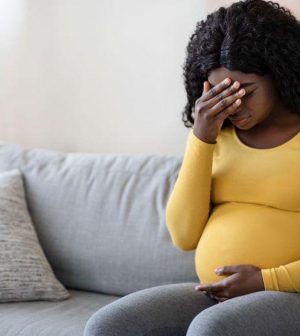- Could Your Grocery Store Meat Be Causing Recurring UTIs?
- Are You Making This Expensive Thermostat Error This Winter?
- Recognizing the Signs of Hypothyroidism
- 10 Strategies to Overcome Insomnia
- Could Artificial Sweeteners Be Aging the Brain Faster?
- Techniques for Soothing Your Nervous System
- Does the Water in Your House Smell Funny? Here’s Why
- Can a Daily Dose of Apple Cider Vinegar Actually Aid Weight Loss?
- 6 Health Beverages That Can Actually Spike Your Blood Sugar
- Treatment Options for Social Anxiety Disorder
Pregnancy-Linked Depression Could Have Links to Autoimmune Diseases

Could the immune system play a role in why some women become depressed during and after a pregnancy?
Swedish researchers have uncovered a “bidirectional relationship” between pregnancy-linked depression and autoimmune diseases such as psoriasis, multiple sclerosis, ulcerative colitis and celiac disease.
In other words, women who experienced depression specific to a pregnancy were more prone to developing these illnesses, and women who already had an autoimmune disease were more likely to develop pregnancy-linked depression, the study found.
“Our study suggests that there’s an immunological mechanism behind perinatal depression and that autoimmune diseases should be seen as a risk factor for this kind of depression,” concluded study lead author Emma Bränn. She’s a researcher at the Institute of Environmental Medicine at the Karolinska Institute in Stockholm.
Autoimmune diseases occur when the immune system goes awry and begins attacking healthy tissue.
In their research, Bränn’s group analyzed data on 1.3 million pregnancies in Sweden between 2001 and 2013. A little more than 55,000 women in the database had developed depression during their pregnancy or within a year of delivery.
Looking at the women’s health histories, the researchers found that those who’d been diagnosed with an autoimmune disease were 30% more likely to develop pregnancy-linked depression, compared to women without such diagnoses.
The reverse was also true: Women with pregnancy-linked depression were 30% more likely to develop an autoimmune illness.
This bidirectional effect was strongest when it came to multiple sclerosis. Women with MS faced double the odds of pregnancy-linked depression, and vice-versa, the researchers said.
Bränn’s team stressed that the study couldn’t determine cause and effect, only associations.
Still, “depression during this sensitive period can have serious consequences for both the mother and the baby,” Bränn said in an institute news release. “We hope that our results will help decision-makers to steer funding towards maternal healthcare so that more women can get help and support in time.”
The findings were published Jan. 9 in Molecular Psychiatry.
More information
Find out more about perinatal depression at the National Institute of Mental Health.
SOURCE: Karolinska Institute, news release, Jan. 8, 2024
Source: HealthDay
Copyright © 2026 HealthDay. All rights reserved.










